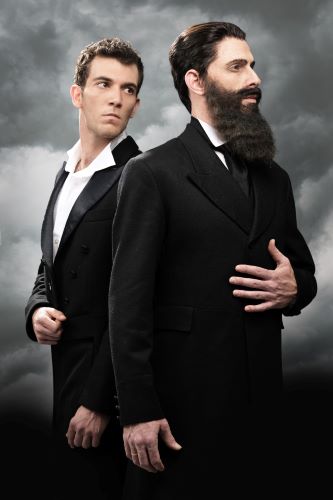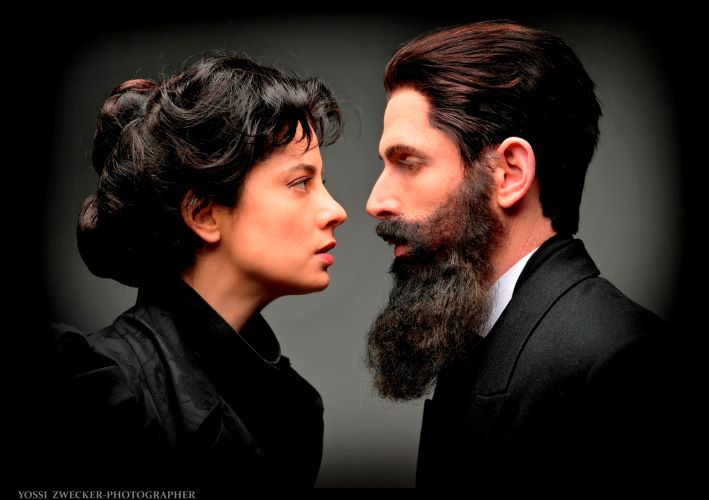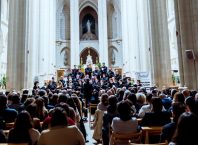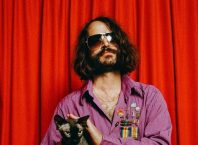Exciting news: the Israeli Opera will present the world premiere of a new, original Israeli opera in Hebrew, Theodor, that focuses on events in the life of Theodor Herzl, visionary of the State of Israel. Composed by Yonatan Cnaan and directed by Ido Riklin, who wrote the libretto, the opera will be conducted by Nimrod David Pfeffer. Opening on May 10, 2023, with performances through May 15th, the opera explores two periods in the life of the young Herzl – as a student in Vienna, and as a 35-year-old during the Dreyfus trial in Paris – and comes at a time when reflecting on the vision and values of the State of Israel is profoundly relevant.
“I believe that this is the end of my life. From this moment onward, history begins…”
(From the libretto)

Theodor at the Israeli Opera*
Theodor took over two years to write and compose. The idea for its creation was put forward by the prominent philanthropist Daniel Jusidman, who assisted in transforming this dream into reality through the support of the Jusidman Foundation.
The opera returns to the inception of Zionism and examines the forces that inspired Herzl to embrace the Zionist vision, which centered on the revolutionary idea of creating a state for the Jewish people. It focuses on stories and events from Herzl’s early life, which are largely unknown to most of us, and on the emotional and psychological motivations arising from these events. Herzl is not just portrayed as the renowned legendary leader and Zionist visionary who appears in the famous balcony photo. This is an unknown Theodor Herzl – a dramatic heart-warming hero, struggling with emotional difficulties, who discovers that his dreams are trampled by reality, who vacillates between despair and madness, while seeking a path to integration and feeling part of; yet is rejected anew each time.
Two themes steer the plot of the opera: One is the young Theodor, the first Jewish student accepted to the “Albia” – the National Pro-German Students’ Union. Like all members of the union, he too has to undergo a duel, a test to prove his German identity, which he does together with his Jewish friend Paul Von Portheim, who is accepted to the union with him. Like other members of the union, he too cheers with the crowd when attending an opera by Richard Wagner whom he admires, and who, at the time, was a symbol of German culture. His German national aspirations implode when during a memorial for Wagner, the chairman of the student union gives an anti-Semitic speech. Theodor objects and requests to leave the union honorably, but the members decide (on the advice of his Jewish friend Paul), to expel him dishonorably. They also reach a decision that they will not accept any more Jewish members. Paul, who tried to curry favor with members of the union, is also expelled, and eventually commits suicide.

The second theme focuses on the Herzl, a 35 years old journalist covering the Dreyfus trial in Paris, who stands astonished at the anti-Semitism demonstrated by the French mob and relives the powerful, traumatic crisis he experienced following his expulsion from the students’ union. Along with this trauma, his miserable marriage is also experiencing a crisis, as his wife Julie wants to leave him. Against this background, he is determined to find a solution to the ongoing persecution of the Jews. After visiting a church, he even considers heading a mass conversion of all the world’s Jews to Christianity.
The opera reaches its dramatic climax in the final scene : the adult Herzl and the young Theodor are both desperate. In an imaginary duet, the two seek a way out of this dead-end. Herzl almost loses his mind, but is then enveloped by a new vision – the establishment of a state for the Jewish people.
From the opera libretto:
Herzl: “Every place
That we will flee to, the poison is there.
Theodor: Find a place that we can flee to.
Herzl: Every place
That we will flee to – we will always be the strangers.
Theodor, Herzl: I am always the stranger
Always “The Jew”
Theodor: We must leave.
Herzl: To where?
Theodor: Think…
Herzl: To a State of Jews”
The Israeli composer and conductor Yonatan Cnaan writes musical works for the lyrical stage. He is a graduate of the Buchmann-Mehta School of Music at the Tel Aviv University and the Conservatory of Music at the University of Cincinnati in the USA. He composed the musicals Greta, The Race to the Spacen, and Messiah Now for the music festival in Bat Yam. He also composed music for the musical Kapara at the Habima National Theater, composed the show Songs in Ashdodit and many other works. He has won several prizes and many awards including the Prime Minister’s Prize for Composers, the ACUM Prize, and more.
Yonatan Cnaan’s comments on writing the opera: “The opera Theodor describes the path taken by the lonely and wretched Herzl through to the vision of the Jewish state. Instead of concentrating on historic events, the opera delves into his internal, emotional struggle. This inspired the composition of pulsating, repetitive, dark music. I personally defined “cinematic music”. It expresses the tortured space in which Herzl moved – between bitter despair at the political situation in Europe, and a feeling of complete failure in his marriage. Out of this darkness, memories of earlier periods in his life surface. The adult Herzl recalls the young Theodor – the charismatic student, determined to integrate, to belong. The music enlivens these flashbacks to the past, like a distant memory, a bit foggy at first, then gradually painted with stronger colors. The joy of life and youth are revived in melody and dance, in the German-Austrian spirit, and in the spirit of the time. When I began composing Theodor about two years ago, I could not imagine that we, our generation, would find ourselves at an historic turning point, relating to the future of the Jewish state. As the writing progressed, real events pervaded the creation, making it more relevant than ever before. It presented us with an opportunity to review Herzl’s texts and the lofty liberal principles which formed the basis of his doctrine”.
Ido Riklin, librettist and director, is a graduate of the Thelma Yellin High School of the Arts and the Royal Central School of Speech & Drama in London. He has lectured and directed at the Beit Zvi School of Performing Arts since 1991. He has served as a director in residence both at the Habimah National Theater and the Beer Sheva Theater. He has directed productions in theaters both in Israel and abroad, and has translated many of these productions into Hebrew. In 2010 he was awarded two prizes for Israeli Theater for the creation and production of the play The Count of Monte Cristo at the Beer Sheva Theater. At the Israeli Opera he staged the operas The Lady and the Peddler by Haim Permont, Schitz by Yonni Rechter, A Midsummer Night’s Dream by Benjamin Britten, Die Fledermaus by Johann Strauss Jr., L’Italiana in Algeri by Rossini and Alcina by Handel. Ido Riklin is the Israeli Opera’s dramaturg and is a lecturer in the Department of Theater Arts at the Tel Aviv University.
Ido Riklin’s comments on writing the libretto and the concept of staging: “Herzl’s biography usually commences with the period during which he conceived the Zionist vision. It appears that Herzl’s life as we know it began at the moment he attended the trial of Alfred Dreyfus in Paris as a 35-year-old journalist, which spurred him on to the conclusions that led to his vision. This is the ethos of the Father of Zionism, as was conveyed to me and as I understood in my youth.
When I began writing this new work about Herzl’s life, I turned to those earlier parts of his biography – parts which he saw fit to embellish, to edit or to erase. When I first read the wonderful biography written by Amos Elon, I noticed an event in Herzl’s youth – when he joined, became wary of, and was expelled from the National Student’s Union “Albia”.
More than anything else, I was fascinated by the dissonance between what was described in the biography and the laconic description in Herzl’s memoirs, which in effect denies most of this episode.
The unfolding of historic events, as described in the biography, certainly re-enforces the intentions of Herzl the adult, and the necessity to find a solution for the Jewish problem. Why did Herzl recoil from this memory? Why does he recall this in a pacifying, even embellished tone? I thought to myself – when a person censors a dramatic moment, during which he encountered disappointment and humiliation – does this not indicate trauma? Trauma which, perhaps, influenced his life? The more I thought about it, the more I saw a theme linking both stories. The small, private, touching story, about a Jewish adolescent who wanted to be accepted into the Nationalist Student’s Union, and who was eventually expelled in shame, and the other story, the historic story, about a Jewish officer who was accused of treason against his homeland – Alfred Dreyfus”.
The conductor Nimrod David Pfeffer was instrumental in establishing the Guatemala Opera and is its musical director. He is also part of the musical team at the Metropolitan Opera in New York. He has conducted productions of Rigoletto (Verdi), L’elisir d’amore (Donizetti), La boheme (Puccini) as well as Verdi’s Requiem. In addition, he has conducted many orchestras including the New York Metropolitan Opera Orchestra, the Mariinsky Orchestra in Saint Petersburg, the New World Symphony Orchestra and others. He also performs as a solo pianist with many orchestras including the Israeli Philharmonic Orchestra. Last season he conducted The Magic Flute at the Israeli Opera.
The production features 12 leading Israeli opera soloists: baritone Oded Reich (Herzl), baritone Noam Heinz (Theodor), mezzo soprano Anat Czarny (Julie, Herzl’s wife), soprano Shaked Strul (Paul von Portheim, Theodor’s friend, a Jewish student in Vienna), baritone Yair Polishook (Herman Bahr, chairman of the Student’s Union in Vienna) as well as bass Yuri Kisin, soprano Tali Ketzef, mezzo sopranos Rona Shrira and Tamara Navoth, tenors Doron Florentin and Oshri Segev and bass Pnini Leon Grubner.
An hour prior to each performance there will be an introductory lecture in Hebrew of about 30 minutes in the theater. Entrance to the lecture is free for ticket holders for that evening’s performance. Tickets may be ordered online on the Israeli Opera website, or call: 03-692777.
*Texts and information from the Israeli Opera press release





